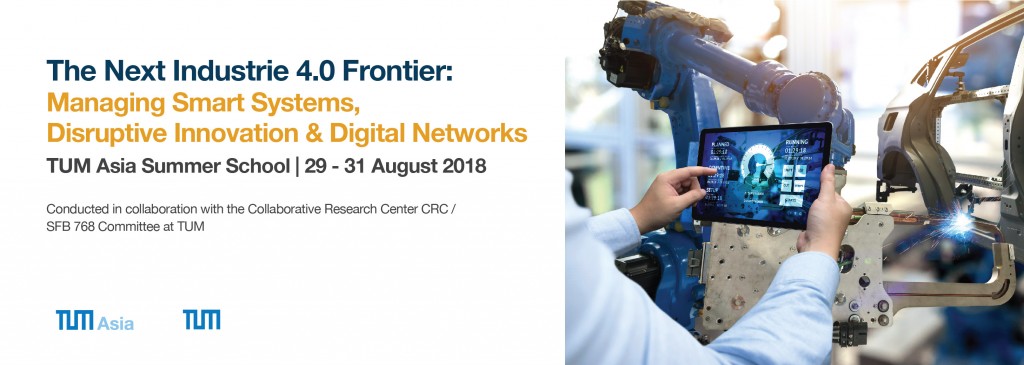
“THE NEXT INDUSTRIE 4.0 FRONTIER: MANAGING SMART SYSTEMS, DISRUPTIVE INNOVATION & DIGITAL NETWORKS”
This 3-Day Summer School Programme will comprise of a series of lectures, case studies and discussions conducted and facilitated by 3 leading departments in the “Industrie 4.0” domain from the Technical University of Munich (TUM). The Summer School is conducted in collaboration with the Collaborative Research Center CRC / SFB 768 Committee at TUM.
BEYOND THE HYPE: WHAT IS NEXT FOR INDUSTRIE 4.0?
Since its introduction, Industrie 4.0 or sometimes referred to as the 4th Industrial Revolution has been at the top of the agenda across many industry conferences, magazines and reports. The hype has created massive awareness of the topic within many companies and the public.
Leveraging on the principles of Industrie 4.0 and its enabling technologies to automate, integrate and optimize manufacturing processes – companies can now achieve shortened cycle times, improved product quality, and implemented efficiency across their operations, while reaping the benefits of manufacturing highly customized products on a global scale.
In an advanced manufacturing environment where modern technologies such as the Internet of Things (IoT), the Industrial Internet of Things (IIoT), automation, cloud computing, Big Data processing, and highly integrated communication capabilities in an advanced manufacturing environment work together –cybersecurity and the social-technical impacts it brings about are aspects that cannot be ignored as well.
PROGRAMME OVERVIEW
Through this Summer School Programme, participants will be able to strengthen their fundamental knowledge and concepts in Industrie 4.0, gain an in-depth understanding of how to manage smart data, smart systems and its enabling technologies, explore aspects of disruptive innovation and learn how to adopt cybersecurity measures when handling projects and manage the risks involved in digital networks.
The Programme will also address a broad spectrum of Industrie 4.0 socio-technical frameworks and explore inter-disciplinary and inter-organisational perspectives. Participants will also learn how these concepts can be applied across various industry verticals and will be able to demonstrate how this knowledge can be integrated and implemented at their own workplace.
PROGRAMME OBJECTIVE
- Appreciate key Industrie 4.0 concepts, relate to their individual businesses and engage the trainers in effective discussions on the next steps to be adopted.
- Strengthen key knowledge and insights relevant to Industrie 4.0 among senior management of local industries.
- Encourage local industries to take the next step towards digitization and optimization of their manufacturing processes and implement network security measures.
- Motivate professionals to adopt agile project management and risk management approaches for digital networks.
- Equip professionals with Industrie 4.0 socio-technical framework knowledge from both inter-disciplinary and inter-organisational perspectives.
WHO SHOULD ATTEND
- Engineers, Professionals, Managers and Executives (PMEs)
- Middle – Senior Management Decision Makers
DOWNLOAD THE COURSE BROCHURE
Module synopsis and timetable of the Summer School are available within the Course Brochure.
CLICK THE LINKS BELOW TO DOWNLOAD OUR SUMMER SCHOOL REGISTRATION FORM
Sign Up As A INDIVIDUAL >>
Sign Up As A GROUP >>
To register for the Industrie 4.0 Summer School, participants are required to complete the following steps:
Step #1: Download the Registration Form and fill in the necessary fields.
Step #2: Email the completed Registration Form to exd@tum-asia.edu.sg, stating “i4.0 Summer School Registration” as your email title.
Step #3: Complete the payment procedure that will be sent via email from the Executive Education team at exd@tum-asia.edu.sg.
If you have any questions, please contact us at exd@tum-asia.edu.sg.
LOCATION
SIT@SP Building, Level 5, 510 Dover Road, Singapore 139660
DATES & TIME
- 29th – 31th August 2018
- 9:00AM – 5:00PM (Lunch & Refreshments are included)
SUMMER SCHOOL FEES
| Course Fees / pax |
SMEs |
Non-SMEs |
| Individual Sign-Up: |
SGD 960 |
SGD 1,200 |
| Group Sign-Up (3 and above): |
SGD 720 |
SGD 960 |
| Single Day Passes |
SGD 450 |
SGD 450 |
APPLICATION DATES
- Opens: 9 April 2018
- Closes: 20 August 2018
SCHEDULE
View the Summer School schedule here.
| Speakers | Module Synopsis |
 Prof. Dr. Sabine Maasen Director of the Munich Center for Technology in Society (MCTS) Prof. Dr. Sabine Maasen Director of the Munich Center for Technology in Society (MCTS)Chair of Friedrich Schiedel Endowed Chair in the Sociology of Science Department of TUM School of Governance Technical University of Munich (TUM)
Dr. Uli Meyer
Group Research Leader |
Industrie 4.0 Socio-Technical Framework I & II: Societal Impacts of Industrie 4.0
Industrie 4.0: An Interdisciplinary Perspective
Industrie 4.0: An Inter-Organisational Perspective |
 Prof. Birgit Vogel-Heuser Prof. Birgit Vogel-Heuser
Head of Chair and Director of Institute |
Comparison of Industry 4.0, IoT, Smart Factory, Smart Data, Smart Systems & Disruptive Innovation,
Engineering concepts of Industrie 4.0, human machine interaction systems and intervention of smart data approaches will be discussed in these modules. These subjects will equip students with the skills to judge and evaluate what an Industrie 4.0 system is, its components, capabilities and the necessity of the underlying models and technologies like agents and data analytics. After the module, students will be able to identify beneficial use cases for their companies and the necessary prerequisites. Students will also learn to model the knowledge of an Industrie 4.0 system as a prerequisite for increased reliability and overall equipment effectiveness. |
 Dr. Manuel Wiesche Chair of Information Systems Dr. Manuel Wiesche Chair of Information SystemsDepartment of Informatics Technical University of Munich (TUM) |
Human-centered Innovation & Design Thinking
Managing Digital Innovation Projects & Agile Project Management
Fundamentals in IT Security & Risk Management in “Industrie 4.0”
Case Studies: Managing Industrie 4.0 & IT Security |

